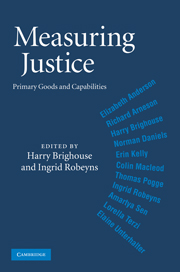Book contents
- Frontmatter
- Contents
- List of contributors
- Acknowledgments
- 1 Introduction: Social primary goods and capabilities as metrics of justice
- PART I THEORY
- 2 A critique of the capability approach
- 3 Equal opportunity, unequal capability
- 4 Justifying the capabilities approach to justice
- 5 Two cheers for capabilities
- PART II APPLICATIONS
- PART III CONCLUDING ESSAY
- Index
- References
4 - Justifying the capabilities approach to justice
Published online by Cambridge University Press: 05 June 2012
- Frontmatter
- Contents
- List of contributors
- Acknowledgments
- 1 Introduction: Social primary goods and capabilities as metrics of justice
- PART I THEORY
- 2 A critique of the capability approach
- 3 Equal opportunity, unequal capability
- 4 Justifying the capabilities approach to justice
- 5 Two cheers for capabilities
- PART II APPLICATIONS
- PART III CONCLUDING ESSAY
- Index
- References
Summary
Thomas Pogge (2002a) has recently criticized the capabilities approach to justice, questioning its ability to specify a plausible criterion of distributive justice that avoids stigmatizing the naturally less well-endowed. In this essay, I defend the capabilities approach against Pogge's critique, and explain why it is superior to its main rivals, subjective and resourcist approaches. A capability metric is superior to any subjective metric because only an objective metric, such as capability, can satisfy the demand for a public criterion of justice for the basic structure of society. It is superior to a resource metric because it focuses on ends rather than means, can better handle discrimination against the disabled, is properly sensitive to individual variations in functioning that have democratic import, and is well-suited to guide the just delivery of public services, especially in health and education.
SPECIFYING A THEORY OF JUSTICE: DO CAPABILITY THEORIES DO THE JOB?
Theories of distributive justice must specify two things: a metric and a rule. The metric characterizes the type of good subject to demands of distributive justice. The rule specifies how that good should be distributed.
Metrics may be either subjective or objective. Subjective metrics include goods such as happiness and preference satisfaction. Objective metrics divide broadly into resources and functionings. Resources are goods external to the person, such as income and wealth, job opportunities, and legal rights. Functionings are states of the person, such as literacy, health, mobility, and the ability to appear in public without shame.
- Type
- Chapter
- Information
- Measuring JusticePrimary Goods and Capabilities, pp. 81 - 100Publisher: Cambridge University PressPrint publication year: 2010
References
- 89
- Cited by

